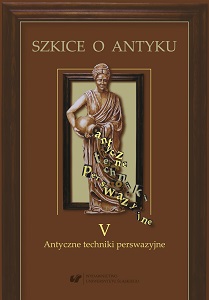
Perswazyjny charakter traktatu Heraklita Alegorety Alegorie homeryckie
Heraclitus’ The Homeric Allegories (Ὁμηρικὰ προβλήματα εἰς ἃ περὶ θεῶν Ὅμηρος ἠλληγόρησεν, Allegoriae Homericae) are the only apology of Homer and his poetry, which has survived to the present. Heraclitus’ aim was to convince readers that Homer, despite philosophers’ numerous accusations, was not a godless person and that his allegedly sacrilegious passages should be read as an allegory. Despite the fact that the Homer’s poems were widely commented by grammatists, Heraclitus was far beyond this practice not only thanks to his precise, non-Atticising style, but also the rhetorical and persuasive character of his treatise. This is especially visible in the treatise’s introduction and in the conclusion, which are closely related. Heraclitus’ oeuvre is an extraordinary work – the exemplary apology, in which the author demonstrated his rhetorical expertise as well as erudition. Heraclitus refutes the accusations of the Homer’s opponents and attacks two of them, Plato and Epicurus. He accuses them of immorality and stupidity. It is difficult to determine to whom the author addressed his work. However, its persuasive character suggests that the author might have desired to reach the widest possible audience of well-educated Greeks.
More...

